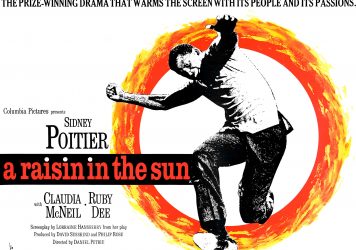Sidney Poitier confronts violent racists in smalltown Mississippi in this sweat-dappled 1967 policier.
Wow… As Dinah Washington once sang, “what a difference a day makes”. It would be disingenuous to say that Norman Jewison’s sweat-dappled southern policier gains a chilling relevance at a time when then the White House is being populated with white supremacist yahoos, because the film’s power was evident long prior to the world going very wrong indeed.
In the Heat of the Night, from 1967, is the story of normalised bigotry, set in the dead-end burg of Sparta, Mississippi. It depicts racism as a way of life, showing people locked into a system which is being propped up with benign segregation and arrogant attitudes. The townsfolk harbour an insidious hatred that has come to fuel a quaint, accepted notion of polite southern society.
A businessman has been found dead on the streets, the promise of a new factory and economic prosperity now dashed. At the behest of Rod Steiger’s gum-chewing sheriff Bill Gillespie, enforcers are told to sweep the area for suspects. Naturally, at the top of the list is Sidney Poitier’s moody, out-of-town detective who just happens to have found himself passing through. Going against his natural impulses, he decides to help them investigate the case once they realise he’s an innocent man. And yet in doing so, he realises that he’s not merely setting out to find a murderer, but to confront generations of ingrained racist tradition. He is Sparta’s worst nightmare.
As Virgil Tibbs, Poitier unleashes a mess of righteous moral confusion. Should he just let the mouth-breathing, chain-swinging scum wallow in their own filth? Should he risk life and limb to deliver a peaceable humanist lesson to his slathering aggressors? And is there a happy ending for either course of action? One of the film’s most fascinating and ambiguous elements is the suggestion that Tibbs sees racism as a natural extension of violent crime, and so his prime suspects are all old guard grandees whose fortunes were built on cotton plantations and black slavery. What’s great about the film (and Poitier’s performance) is that it’s never stressed that he’s a hero or a saviour. His status is far more ambiguous and interesting than that.
The film’s dutiful thriller mechanics are far less important than its politics – it has passed the test of time more for the small gestures and the iconic lines of dialogue. One moment that still sends shivers down the spine is when Tibbs confronts Larry Gates’ rich landowner Eric Endicott. He questions whether this avowed and openly racist fop might have had motive for murder, for which he is slapped. Almost as a natural reaction, Tibbs slaps him back. This single moment encapsulates the resistance, the fight back. What’s most telling, though, is how physically and emotionally shaken Endicott is by the transaction. He knows his time is up.
Published 16 Nov 2016
Not a film that is often discussed in modern movie circles.
Its political impact is contemporary rather than historical. Sadly.
Poitier, not Steiger, should've won the Oscar.

These beautiful, revealing posters highlight African-American culture’s contribution to cinema.